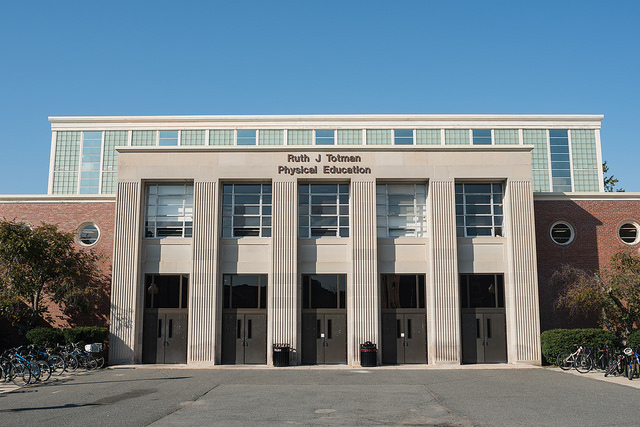I was sitting in my dorm room last semester when the fire alarm went off. My first thought was to quickly jump to my feet and proceed in an orderly fashion to the door — however, I was on crutches at the time. It was only a few minutes later when I heard everyone hustling down the halls and down the stairs. As the fire alarm continued to blare, I stayed seated. I peeked my head into the hall, and pursed my lips. This is when I asked myself, “Now what does someone with crutches do in a building where the elevator seldomly works?” Well, the answer was to stay on my floor. I was lucky that it was just a drill.
I am grateful that my stint on crutches came with a timeline and that the University of Massachusetts was able to provide specialized transportation to and from my commitments on a fixed time frame. Although UMass was able to offer me semi-varied assistance as a student on crutches, perfect it was not.
Like many campuses across the country, UMass is not completely handicap-accessible. For example, both Boyden and Totman are deemed “not all floors accessible”. Although most students are not going to these gymnasiums on the regular, they do happen to be one of the most common testing centers during exam time. From my own personal experience, crutches and a calculus exam on the third floor do not go hand in hand. But without doubt, UMass pulls through with not a modern-day elevator, but a freight elevator.
Another issue that lies in the midst of pseudo “handicap-accessible” buildings, pathways and entrances, is that they are not truly accessible. Have you ever tried opening a door to a handicap accessible bathroom that isn’t automatic while in a wheelchair? What about conquering the ramp to the Franklin Dining Commons on crutches ? Or attempting to go through Grab-n-Go for late night with your friends in Berkshire? With what elevator?
Former Collegian columnist and UMass alum Matt Kushi wrote an article in 2009 titled, “The road to a better school is handicapped-accessible.” In short, Kushi argues that UMass needs to be better when it comes to constructing a far more accessible campus for students with disabilities. Many of Kushi’s points mirror mine, such as the elevator conundrum in Boyden and pseudo-accessible ramps to certain buildings. Here we are in 2018, ranked the 26th best public university in the country, and UMass still has many of the same issues from almost a decade ago.
Aside from it being in the best interest for learning institutions to provide accessible accommodations, it’s also the law. The Americans with Disabilities Act will be celebrating its 29-year anniversary this July. Essentially, the bill aims to set regulations for employers and institutions, including all schools, to provide accommodations for disabled people. However, because this law is so vaguely worded, there is a lot of room for interpretation on behalf of the employer and or institution leading to do only pro forma ADA compliant buildings, like a building with an elevator, but no ramp to enter the building.
This reality for disabled students is simply not okay nor justifiable. As the number of disabled students enrolling in places of higher learning continues to rise, universities need to work to better accommodate students with disabilities. With the odds working against those with disabilities at secondary education facilities, universities should be actively working to make classrooms and dining halls far more accessible to students. Accessibility should be taken into heavier consideration when determining what new toy our dining hall needs next. Wheelchairs and crutches should not be barriers to education.
Morgan Reppert is a Collegian columnist and can be reached at [email protected].




















Ed Cutting, EdD • Sep 20, 2018 at 5:31 am
Typo — UMass refused to RECOGNIZE the State issued HP placards & plates.
Memory is that a member of the public sought to attend an event at the FAC and wasn’t able to park there because he didn’t have a UMass HP decal, which he couldn’t get because he wasn’t student, staff or faculty — he was attempting to attend a public event for which he’d purchased a ticket.
Ed Cutting, Ed. D. • Sep 19, 2018 at 3:41 pm
First and foremost, never, NEVER, use an elevator in a fire drill or real fire — NEVER, NEVER, NEVER!!!! The main reason for this is if there actually is a fire, the elevator will bring you to that floor and leave you there — and you will be [bleeped]. Yes, firefighters use the elevator, but they have an override key which enables them to tell the elevator where they want it to go, instead of where it wants to go. And they also have Scott Packs (breathing apparatus) that you don’t have.
.
Second, the Cluster Office and RD are supposed to have a list of everyone in the building who is disabled and if it’s a real fire, the firefighters will go on an individual basis and rescue each of these persons. So two fire guys would have carried you out of the building — they wouldn’t have bothered with the crutches — and set you down in a parked PVTA bus called for the situation (because it is warm & dry.
.
As to the larger issue, this is the same university that told the Federal Government that it would cost $500 to purchase a sign that I could purchase (on a UMass account) for $7 at a now-closed Northampton hardware store that UMass bought lots of stuff from. ADA compliance has been a combination of bloated wasted spending and utter refusal to comply.
.
My personal favorite story is when UMass refused to issue state-issued HP placards & plates. Yes, they lost a MCAD complaint over that one…